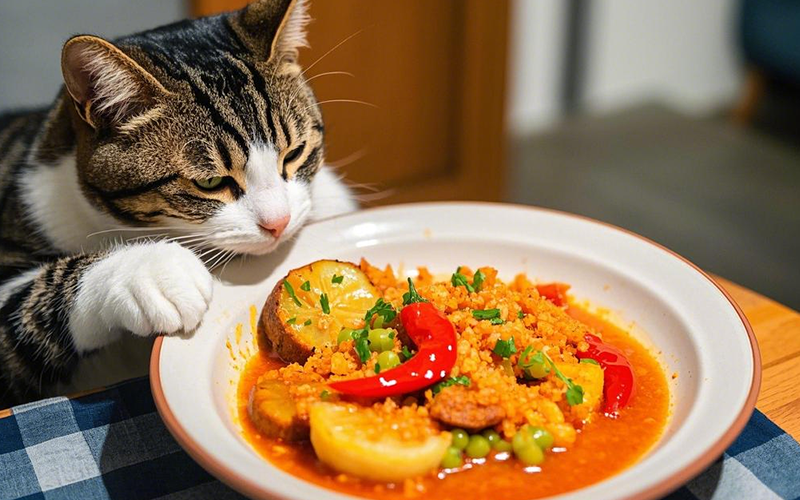Can Cats Eat Spicy Food? The Dangers of Spicy Meals for Your Feline
- 19 Mar 2025 10:26
If you’ve ever enjoyed a spicy meal, you may have wondered whether your cat could handle the heat. After all, they’re curious creatures and often want to sample whatever you’re eating. But when it comes to spicy food, the answer is a resounding no—cats should not eat spicy food. Here's why it's important to keep those fiery dishes away from your furry friend. 🌶️😿

Why Spicy Food is Bad for Cats 🚫
Cats have a very different digestive system compared to humans, and they’re not equipped to handle the strong flavors and compounds in spicy foods. Let’s explore the reasons why spicy food can be harmful to cats:
Gastrointestinal Upset 🤢
Spicy foods contain compounds like capsaicin, which is responsible for the "heat" sensation we experience when eating spicy peppers. Cats’ digestive systems aren’t built to process capsaicin or the strong spices that often accompany spicy dishes. Eating spicy food can irritate their stomach lining, leading to symptoms like vomiting, diarrhea, and discomfort. 😾
Burning Sensation 🔥
Capsaicin, the substance that makes food spicy, can cause a burning sensation in your cat’s mouth and throat. While humans can tolerate or even enjoy this sensation, cats do not have the same tolerance. This discomfort could cause your cat to drool excessively, paw at their face, or even refuse to eat altogether. 😿💦
Toxic Ingredients ☠️
Many spicy foods are also loaded with ingredients that are toxic to cats, such as garlic, onions, and certain spices. These ingredients can cause serious health issues in cats. For example, garlic and onions can damage red blood cells, leading to anemia, while other seasonings can cause digestive problems. Avoid giving your cat any food that contains these harmful substances. 🧄🧅
Dehydration 💧
Spicy food can cause cats to feel hot and thirsty, which may lead them to drink excessive amounts of water. In some cases, this can contribute to dehydration, especially if your cat is already not drinking enough water. Overconsumption of water can lead to frequent urination, which may cause further discomfort. 🐾
Symptoms of Spicy Food Poisoning in Cats 😿
If your cat has eaten something spicy, they may show signs of distress. Look out for these symptoms:
Excessive drooling or pawing at the mouth
Vomiting or diarrhea
Lethargy or weakness
Decreased appetite or refusal to eat
Unusual behavior, such as restlessness or discomfort
If you notice any of these symptoms after your cat has eaten something spicy, it’s essential to monitor them closely and contact your vet if symptoms persist or worsen. 🏥
Can Cats Handle Mild Spices? 🤔
While most spices are not ideal for cats, some very mild spices may not cause immediate harm in tiny amounts. However, that doesn’t mean you should feed your cat spicy food or seasonings intentionally. Ingredients like cinnamon, nutmeg, or turmeric are not toxic to cats in small amounts, but it’s always better to avoid seasoning your cat’s food with anything other than their normal, balanced diet. 🌿
Safe and Healthy Treats for Cats 🍖
Instead of spicy food, treat your cat to some delicious and safe alternatives. Here are a few healthy options that cats can enjoy:
Plain Cooked Meat 🍗
Cats are obligate carnivores, so they thrive on protein-rich foods like chicken, turkey, or lean beef. Just make sure the meat is cooked without any spices or seasoning.Cat-Specific Treats 🐾
There are plenty of commercial cat treats that are specially formulated to meet your cat’s nutritional needs. These treats are safe, tasty, and far healthier than spicy foods.Fish 🐟
Fish like tuna or salmon, served in small portions, can be an enjoyable treat for your cat. Just ensure there are no bones, and avoid giving them fish with added salt or seasoning.Catnip 🌱
Many cats love catnip, which can be a fun and harmless way to give them a treat. It's safe and enjoyable without any risk of digestive upset.
How Technology Can Help with Pet Health 🧠
If you’re ever uncertain about what foods are safe for your cat, or if you need advice on their health and diet, consider using PettureX. This pet AI software offers 24-hour online consultations and pet image recognition, allowing you to get personalized recommendations for your cat’s well-being. It’s a great tool for any cat owner who wants to ensure their furry friend stays healthy and happy! 📱😻
Final Thoughts: Can Cats Eat Spicy Food?
To sum it up, no, cats should not eat spicy food. Spicy foods can irritate their digestive system, cause discomfort, and even lead to toxic reactions due to harmful ingredients like garlic and onion. Stick to safe, meat-based foods, and offer your cat treats that are specifically designed for their dietary needs. Always keep spicy food out of reach to avoid any unwanted mishaps.
If you ever need advice on what’s safe or have concerns about your cat’s health, PettureX can help you make informed decisions and keep your furry companion in great shape! 🐾❤️
Related

The Burning Question: Can Cats Eat Jalapenos? A Comprehensive Safety Guide
- 21 Apr 2025
Cool Temptation: Can Cats Eat Ice Cream Safely? The Vet-Backed Truth
- 21 Apr 2025
Frankly Dangerous: Can Cats Eat Hot Dogs? Vet Explains the Serious Risks
- 16 Apr 2025
A Purrfect Protein? Can Cats Eat Ground Turkey Safely? (Vet-Reviewed Guide)
- 16 Apr 2025
Gritty Situation: Can Cats Eat Grits Safely? Vet Explains the Risks
- 16 Apr 2025
Gravy Danger Zone: Can Cats Eat Gravy Safely? (Vet-Reviewed Warning)
- 16 Apr 2025
Crunchy Query: Can Cats Eat Green Peppers? A Vet-Reviewed Safety Analysis
- 16 Apr 2025
Toxic Temptation: Can Cats Eat Grapefruit? Vet Explains the Dangers
- 16 Apr 2025
Emergency Meal or Major Mistake? Can Cats Eat Dog Food For A Couple Days? (Vet Guide)
- 16 Apr 2025
Dandelions & Felines: Can Cats Eat These Common Weeds Safely? Vet Explains
- 16 Apr 2025
